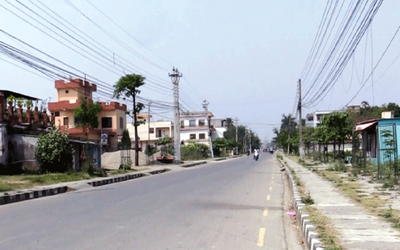Dignity, as defined by Merriam Webster is: “The quality or state of being worthy, honored or esteemed.” Men are honored when they erect, they are looked up to and perceived as a ‘man.’ Men are honored when they grow facial hair and develop a deeper tone of voice. But once a woman has her period, she is immediately a target of rape, prejudice, separation and dehumanization. Chhaupadi is an inhumane act against menstruating women. But as I have learned from my own ignorance, Chhaupadi is often used to define the act of placing women in a separate hut during their period, but rather it should be interpreted as the umbrella term for the act of any separation during a woman’s period. From being denied entry into the Hindu temple to being told not to discuss menstruation in public, Chhaupadi is present across the globe. Like Ms. Radha Paudel said to me during our first meeting, Chhaupadi is the Nepali translation for menstrual discrimination, just as Namaste is the Nepali translation for hello in English. As a developing woman from the United States, I have experienced menstrual discrimination. Many people think of only South Asia when menstrual discrimination is mentioned, but even in first world nations, menstrual discrimination thrives.
When I was only 10 years old and in the United States, my mom came into my room and closed the door. She quickly told me that if I see blood in my underwear I have to tell her. She asked me if I understood. I did not understand, but because of the manner in which she told me, I thought it was best that I did not ask questions. She quickly closed the door on her way out. I was confused. Why would I see blood in my underwear? It was the month of May when I went to the bathroom and as I removed my underwear I saw a dark brown stain. It was not red so I overlooked it and did not mention a word. The next day I saw the same stain and I was convinced that I did not shower well enough, it did not look like blood to me. Even though something was obviously happening to my body, I did not want to mention it since reproductive health, especially in the United States, has been socially structured as a ‘secretive’ topic. Until it happened again and I thought something was wrong with me. I stood in the bathroom for 10 minutes until I decided to call for my mom. She came in and showed me how to put on a pad, but after that there was no explanation of why it happened. It was then that I took matters into my own hands and began to research. That was when I realized I had my first period.
Towards the end of my 6th grade human biology class, we covered the Reproductive System. The upsetting thing was, we discussed the process of having an erection, but not once was menstruation mentioned. I took Honors Anatomy and Physiology and again menstruation was not included in the lesson plan for Reproduction. So as a personal project, I created a Menstruation presentation and presented it to the class. I brought in pads and tampons and asked the boys in our class to hold onto them, telling them pads and tampons are not venomous things. They are not shameful or private, they are sanitary products used to help women during their monthly cycle. With the informative slides I ended with the statistics on the negative social beliefs surrounding menstruation and emphasized the importance of normalizing the word ‘period’ ‘pad’ ‘tampon’ and ‘menstruation.’ Any act that contributes to hiding menstruation, is an act of ‘Chhaupadi.’ It is important that we do not immediately connect Chhaupadi to the act of placing women in huts. It is so much more than that and is prevalent all around the world.
Menstrual stigma has not only affected me, but menstruators world wide. Menstruators in India face similar religious restrictions, as they are frequently told that they should not attend the Hindu temple. Menstruators in Kenya are forced to have sex in exchange for period products. Menstruators in Zimbabwe are restricted from medical care and sanitary products in prison. In the United States, menstruators in the immigration detention centers (along the U.S.- Mexico border) were given one pad or one tampon for each day (medically required to be changed every 4-6 hours) and there continues to be a tax on tampons while items such as twix candy bars and potato chip bags continue to be exempt from the sales tax, deeming period products to be luxury items. Menstruators in Cambodia are not able to change their sanitary pads at school because they do not have the proper facilities, leaving young girls no choice but to leave during the school day, negatively impacting their access to a fulfilling education. Many other places continue to follow the taboo by making girls feel uncomfortable and unconfident. I myself have been a victim of the social taboo and I know every single menstruator around me has felt the same to some extent.
When I went to the bathroom at school to change my pad, I felt pressured to hide it because I worried about what people might think. I whispered whenever I asked my friends for medicine because of my excruciatingly painful menstrual cramps. I used to hesitate to ask my dad to buy pads. I cried when I first stained my bed sheet with period blood. All of my experiences are results of the belief that menstruation is a burden rather than a blessing. This mindset forces women into believing they must remain submissive. They are taught to be silent and to stay silent. Men become domineering. The power that was once held by women, gets placed into the hands of men and men grow accustomed to the power that is given to them. Women grow accustomed to having their dignity stripped away from them and learn to look up to men rather than looking at men from the same level. This becomes a normal practice throughout society and men use the power that they gained to take advantage of women who have adhered to remaining compliant to men. This leads to many gender-based acts of violence such as rape, domestic violence, acid throwing, sexual harassment, and forced prostitution. I should not feel ashamed of a bodily process that I cannot control. I should not feel ashamed to mention the word ‘pad’ or ‘period’ to my own father. I should not feel responsible for my heavy flow causing me to leak through my pad and stain my bed. But this was all caused by the lack of dignity behind menstruation. Without dignity there is no environmental consciousness, there is no consideration for sanitation, there is no religious support, there is no communication between genders, there is just silence, submission and social injustice. The issue is urgent meaning the issue must be solved with an equal if not more prominent sense of urgency. It affects women everyday and if it is not resolved soon, it will continue to harm women not only around us but everywhere around the world. If there is no dignity behind menstruation, there is no menstrual equity, there is no way to normalize the discussion of periods, there is no way to dismantle the belief that menstruation is a sin. Dignity is significant in that it includes every aspect of physical, emotional, educational, environmental, and economic well-being. Start with dignity, and everything else will fall into place.
In mid-October, I attended a Period Rally, to speak up about the present taboos and unfair systems put in place in the United States against menstruation and menstruators and needless to say, it was one of the most impactful moments of my life. We started with speeches from a few legislators who talked about their stances on period poverty and period stigma. At the end, we held an open mic to share stories about our experiences and why we are proud to have our period. The last speaker hesitated to go up, but once she stood in front of all of us, she looked up and firmly grasped the mic. She was a victim of sexual abuse. Her voice broke as she said that she was never so excited to see that she started her period. It was that minute that I decided I wanted to go to Nepal. Her traumatic experience did not silence her, but rather it gave her another reason to fight on behalf of other women who have had similar experiences. From watching my Grandma tell my mom she cannot eat with Buwa (Grandpa) and Baba (Dad) because she is on her period, to witnessing my friend fall to the ground in tears after her parents forced her to take birth control to avoid having her period on the same week as a major religious ceremony. I decided to go to my own roots to research and help alleviate the psychological impacts to prevent our future generation of female leaders from experiencing similar unjust treatment. I had the resources and so I took advantage of my privilege for the good of my own community, just as she used her voice to instigate change in her’s. Nepal is my home, my comfort, my one true love. But it is a home that needs change and love, as does every nation. I encourage you, if you have the resources, to use your privilege as a motivator for you to help those who do not have access to the same resources and privileges.
Kandel (Senior at BASIS Mesa and Intern at the Radha Paudel Foundation)

















